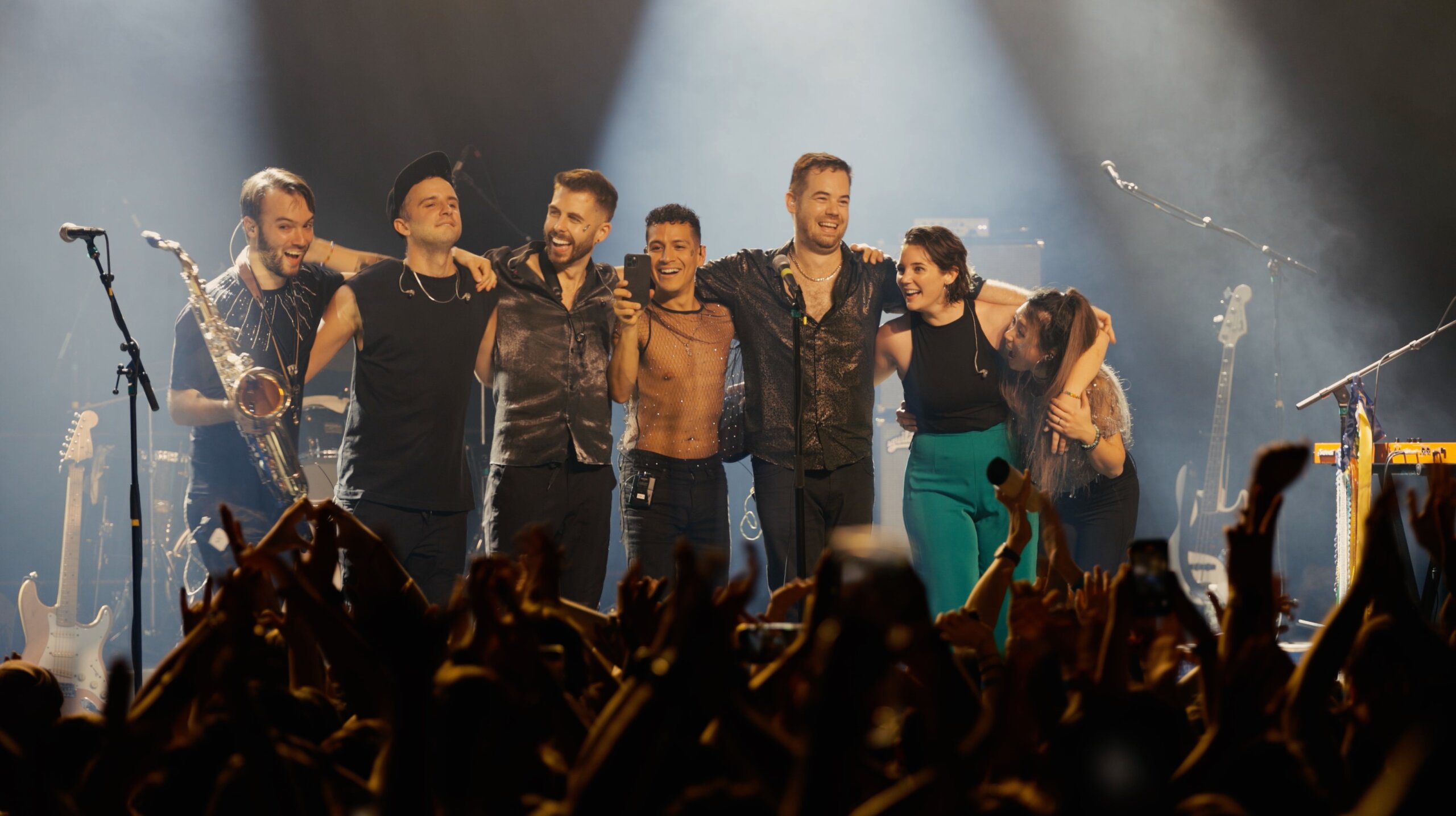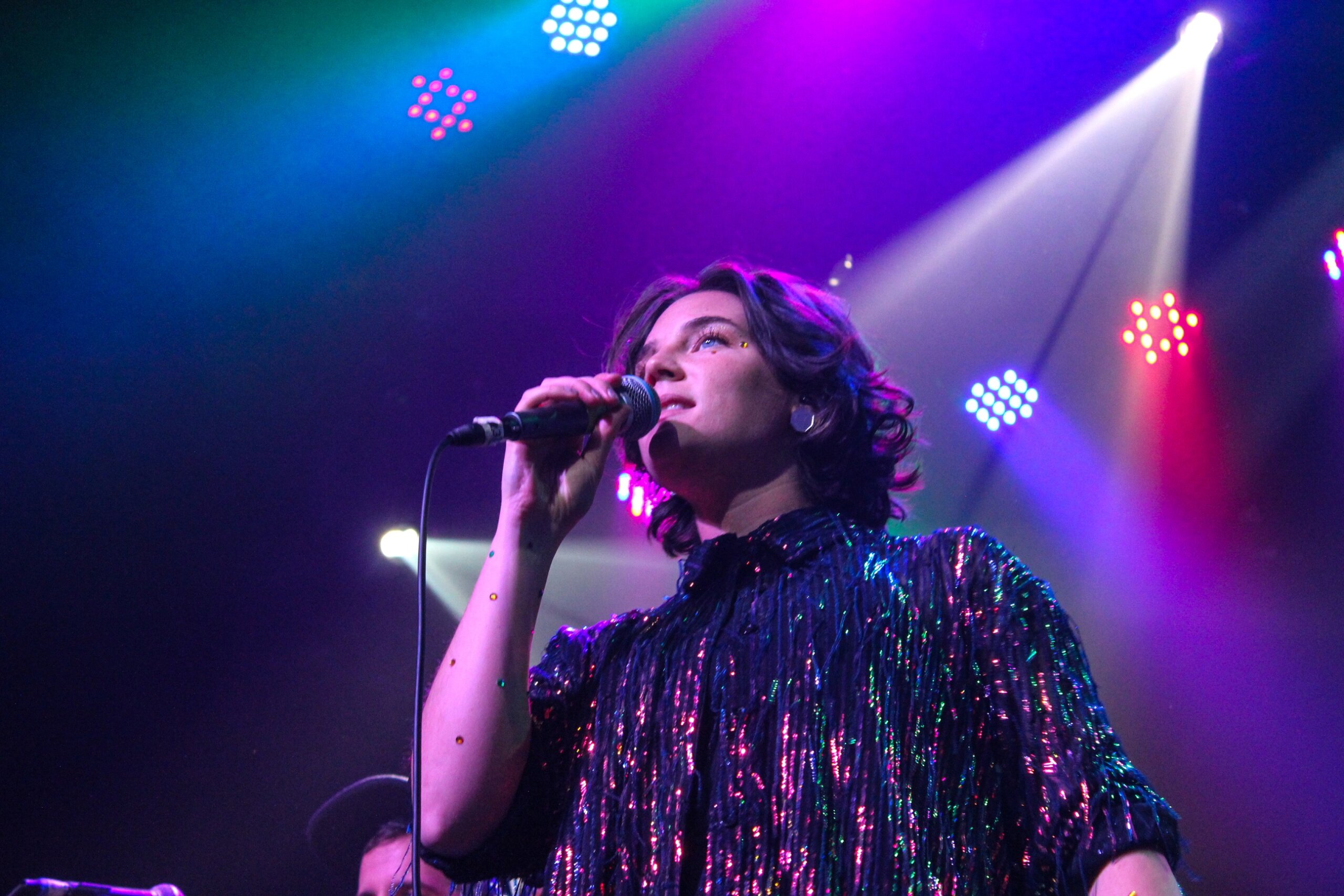Before the heaviest downpour I’ve ever seen in my life, before my precious post-grad roommates and I sprinted—lungs heaving and shirts translucent—to the beer tent and definitely before I felt the effects of the gummies and prosecco I inhaled next to a graveyard, two friendly young folks checked our bags and then put “over 21” bracelets on our wrists. They told us the same thing: “We only volunteered for this music festival so we could see Sammy Rae.”
It’s not hard to understand why. The 28-year-old bandleader, who appears on stage with sequins on their clothes and craft gems on their face, belts theatrical jazz riffs and commands the space with a once-in-a-generation kind of charisma. And while you could assume the big appeal of Sammy Rae & The Friends is appearances—immaculate vibes and little else—her songs, which speak about coming of age with candour and warmth, are what really bring the crowds. “Denim Jacket” is about coping with social anxiety in creative ways; “Good Life,” “Talk It Up” and “Living Room Floor” are about finding your way as a young person in a big city; “Whatever We Feel” is about you doing you, joyfully and without a care for what others think; “Kick It To Me” is about sticking together and connecting to your circle on a soul-level; “Jackie Onassis,” a fan favourite, looks back on a queer first love.
The band’s fresh approach resonated, and Sammy Rae & The Friends gained fans fast—very fast. Spotify’s algorithm put their singles “Kick It To Me” and “The Feeling” on streamers’ individualized Discover Weekly playlists, and from there, their live shows took off. Venues in 2019 sold out even as they grew in capacity from 100 people to 200, 350, 730 and more. In 2021 alone, there was a tour, an elaborate music video, an EP, a Brooklyn Steel gig that sold out 1,800 spots “very much immediately” and even a TikTok trend (surely you’ve heard of the Dancing Queen One Breath Challenge).

Credit: Debbie Wilson
But there’s one thing that made my Sammy Rae & The Friends concert stand out more than any other concert I’ve ever been to: I looked around and realized I was in a sea of queer femmes who deeply resonate with both the songs and Sammy herself. At a Sammy & The Friends show, you get to see a deeply earnest and aware person doing what she does best: singing her heart out, creating new spaces and avenues for intimacy, bringing people together and unapologetically existing as herself.
As The Friends embark on their new cross-country tour, “Follow Me Like The Moon,” they’re kicking off the next phase of their meteoric rise with a new single of the same name, released on Jan. 14. Xtra spoke to Sammy about bravery in the scope of songwriting, what artistry means to them and how she wants to be friends with you—all of you.
For all of the new folks out there, give us a run-down: What’s a Friends show like? What’s your relationship with your fans like, especially with the queer folks in your audience?
When it comes to our fans, it’s no joke that we call everybody “The Friends.” Whenever we look out at the audience, I’m seeing how they’re dressed, how they’re carrying themselves, how much fun they’re having, and I want to be friends with every single one of them.
The live experience of a Friends show is also about who’s around you in the audience. Like, “Oh look, that person looks like me!” I try to create a space for younger people to be themselves, loudly and boldly, as early on as possible. We’ve kind of hit people over the head with the points of: you’re invited, you’re welcome, you’re safe, you’re accepted. People are so frequently told the opposite that our music will always have those themes. But I think queer folks, and particularly young queer folks and young queer femmes, are more in need of that space actively being carved out for them.
Sometimes when spaces are carved out for folks who don’t often get much of it, there’s pushback: inclusive spaces can be misinterpreted as exclusive ones. But it seems like that’s pretty much the opposite of your vibe.
Yeah, absolutely. I was doing this podcast with this standup comedian who was a 50-year-old straight male, and he was like, “Can I come to your show if I’m straight and not 23?” And I was like, yes! One hundred percent. That’s the whole thing: I want to create an environment where everybody feels like there’s room for them, so they can come and experience whatever this crazy party is that we throw.
Tunes like “Jackie Onassis” might speak more loudly and closely to a young queer femme, but I’ve also had plenty of straight women tell me, “This song reminded me of my best friend who lifted me up in my womanhood when I was in high school.” I could’ve gone harder with the queer coding, but I wanted there to be ideally a little bit of something for everybody. For me, a good benchmark for accessibility is always a child. Would a child understand this if I played it for them? Because if a child can get it, then everyone can get it. I leaned really hard into that with “Whatever We Feel” and with “Saw It Coming.” We’ve had people say, “My eight-year-old loves ‘Saw It Coming’ and my five-year-old loves ‘Whatever We Feel,’ but so do I, and I’m their mom, and I’m 50.” I love that.
On Zach Lupetin’s podcast The Show On The Road, you said that if this whole band leader thing didn’t take off, you’d be a kindergarten teacher. And it makes sense—there’s a childlike sense of wonder imbued in everything from your EP covers to your stylistic delivery as lead singer, and even to the way your bandmates embellish your tunes with their instruments. How else does your kindergarten teacher alter ego inspire your work?
I think we underestimate kids a lot, and I think kids are capable of accessing really big and profound themes that we often don’t give them a chance to explore. I’m obsessed with this character archetype of the perpetual child. If you take Mr. Rogers as an example, he’s a grown man, but he’s so tapped into his childlike imagination and his childlike intuition that he’s almost beyond age. He’s so comfortable just being Mr. Rogers in his Mr. Rogers outfit, walking through the world, that he seems to be beyond gender and beyond age—not unlike children, because they haven’t been forced into boxes yet.
That perpetual child energy is something I try to portray in who I am on stage. I had a friend who told me that when you get to where we are—playing for hundreds or thousands of people every night—you start to attract your younger self. And that’s really special because my younger self was so queer and had no idea what to do with that or where to put that. I had no role models and I certainly had no peers who were openly queer.
What does queerness in the context of friendship look like for you now?
With my dearest and queerest, it’s not the cornerstone of our friendship. My favourite relationships are the ones where we are queer folks who have an understanding that we’re this thing which is unlimited, but we can talk about other things and challenge each other in other ways.
Also, I identify as somebody who is bisexual, and I have a lot of great friends, and even members of the band, who understand bisexuality the way that most people do when they’re introduced to it: 50-50. Which is like, LOL? And is hugely biphobic. We’ve had to work with friends who have every intention of being good allies to actively be like, “It’s not like that.” It doesn’t just show up when you’re an adult, and it can come and appear and disappear; it’s malleable, it’s fluid. To be queer is to be unlimited.
Losing friends is a big and more uncomfortable part of coming of age. “Friendship” is your whole thing, but you don’t really have any songs about friendship fallouts.
It’s a hard thing to write about. I’m kicking around this song that I haven’t quite finished yet that kind of follows those themes, and I hope to be brave enough to finish it. It’s essentially about this idea of how somebody can be your whole world and you shape your identity around them, but then they can go away and not be that for you anymore. You’re different people now, and there isn’t a reality where trying to maintain that relationship wouldn’t be a detriment to you both.
What does it take to be brave enough to finish a song? What does bravery look like as an artist?
It’s difficult to not be overly precious when releasing something, because [once released] it’s not just my thing anymore or my processing tool—it belongs to everybody. They’re going to perceive it how they perceive it, and that’s good, and I know it’s going to be something different from what it gave me.
Sometimes you get worried: If it’s inspiration that comes solely from me, how will it change the way that I’m perceived? If it’s inspiration that comes from an event or somebody else, how long will it be until they hear it, and is it unfair to them? For instance, this song about going separate ways with a friend—since I’m getting the last word, and they don’t get a chance to offer their final piece, is it unfair for me to release this?
For example, I’m not a huge fan of Taylor Swift—I think she’s fine and well but her art is very literal. And with her living in the public eye, it’s, “Oh my God, this is a song about Jake Gyllenhaal.” And like, that’s fine… unless you’re Jake Gyllenhaal, right? With “Jackie O,” there’s this moment of knowing that everybody who’s a queer femme in our audience is going to love this song and it’s going to serve them a lot. But how will my mom and dad and grandma and uncle and first girlfriend perceive this? That question is bigger than everything. But, again, if everybody wrote everything exactly the way it happened, it wouldn’t be interesting, and it wouldn’t make sense to anybody else. So you have to take creative liberties and either stretch the truth or scale things back.
Maybe the thought process you have surrounding artistic responsibility is something that just comes with the territory, but it seems that there’s a certain level of maturity you need to reach before you can work through those questions in any real way. What does it mean to come of age as an artist?
I think I am still coming of age in my artistry in an enormous way. I think to be an artist is to tap into that perpetual child-mind thing, and I can always kind of reinvent and create new stories. For example, I’m a huge Paul McCartney fan, and we all know The Beatles: they have this enormous, beautiful discography. But then The Beatles broke up, and—this is an extremely hot take, I don’t think I’ve ever said this out loud—I think a great deal of the Wings’ catalog, which is Paul McCartney’s project that came after The Beatles, is not only three times as long and as in-depth, but a lot of it is better than what The Beatles did. My hope is that I’m never done coming of age artistically.
Speaking of new stories, your band just closed a chapter: you concluded your first headlining tour at the end of 2021, with your second starting in January. What big ideas have you been thinking about recently? What direction is your songwriting heading in?
I’m not one of those artists where it pours out of me. I very infrequently write, and I wish that I was a little more prolific in terms of volume of catalog than I am. I feel like I’m going back into a writing season, though. We have a great deal of free time in February, and I hope to do some big work with the band then.
At this point, I know who our audience is now. It’s a blessing. I think they trust us enough—and I certainly trust them enough—that I feel like it’s safe enough to venture into some less-celebrated moments of coming of age. “Denim Jacket” is a song about being socially anxious, and you win because you put your jacket on—that’s great, we got to the end, we won. But there’s a whole process of what it’s like to be anxious, or what it’s like to be sad, or what it’s like to be lonely, or depressed, or nervous or feel unsure. You can’t learn a lesson about why you don’t need to be anxious unless you’re anxious, so what’s it like to do that? It’s time for me to toughen it up a little bit. But our audience knows that we’re always going to let them come out on top. I know that they’re going to be on my team because they know I’m going to be on their team.
You can see Sammy Rae & The Friends in Toronto on Friday, March 11, at The Legendary Horseshoe Tavern. If you’re in the United States, you can find them touring coast to coast January through April.
This interview has been edited for length and clarity.


 Why you can trust Xtra
Why you can trust Xtra


